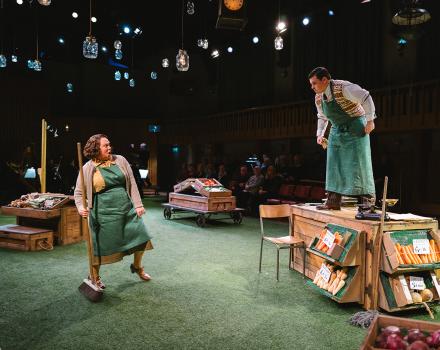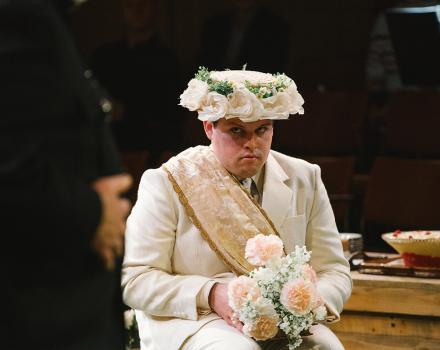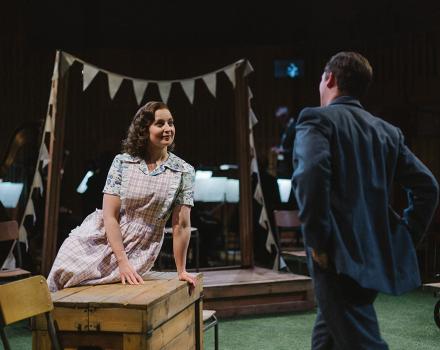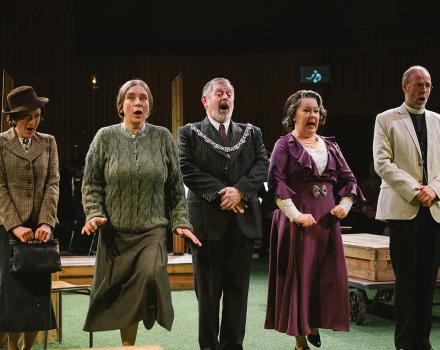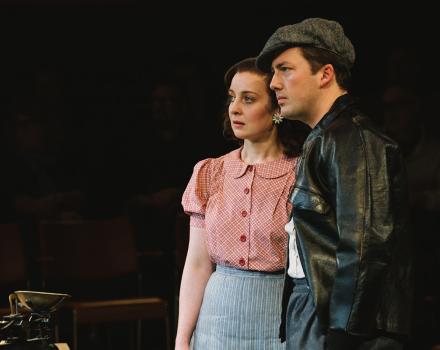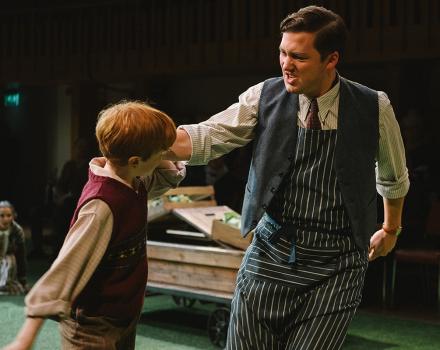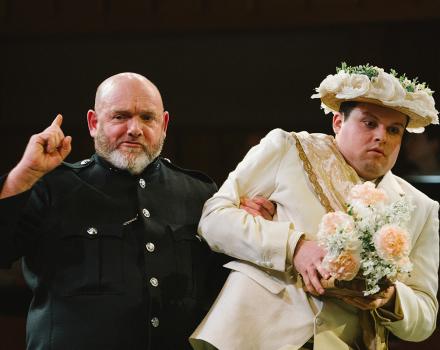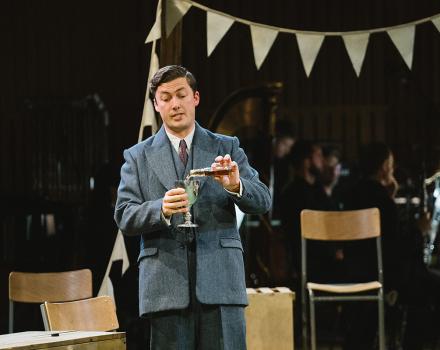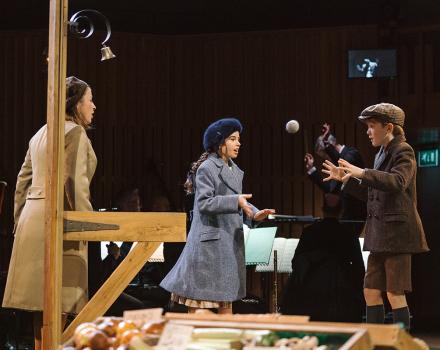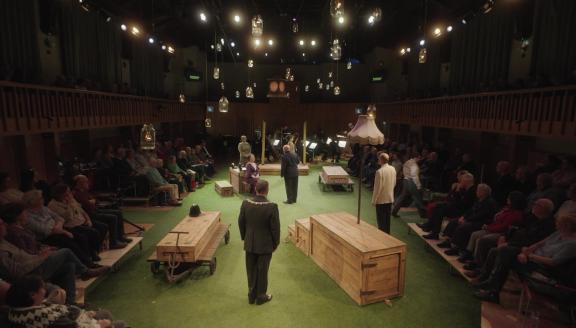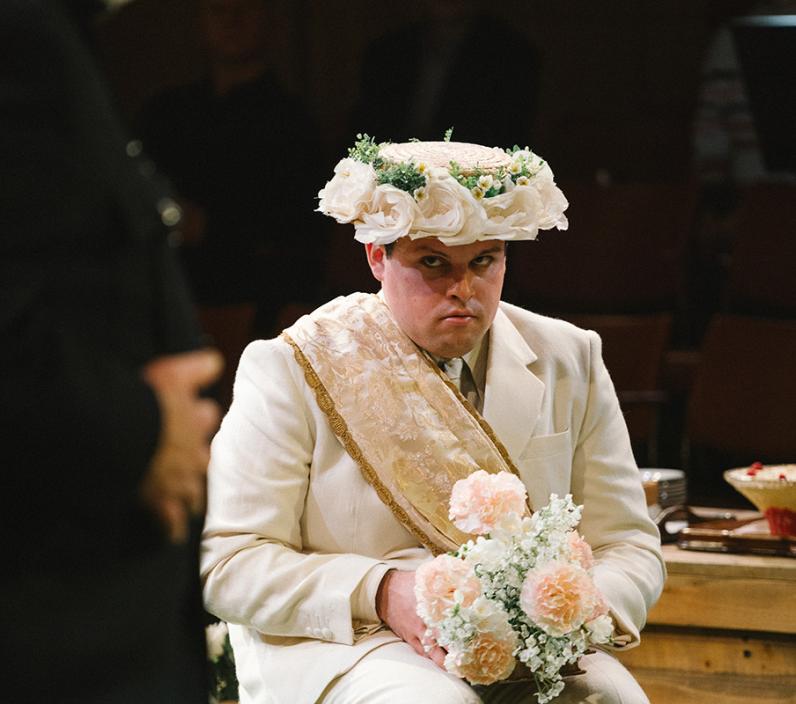
Albert Herring

The village of Loxford is looking for its May Queen (the personification of spring time innocence) but all candidates are deemed morally unsuitable. Desperate, the locals decide a May King will have to do instead. They choose the blameless Albert Herring from the local fruit and vegetable shop. He isn’t keen but, stuck firmly under his mother’s thumb, he’ll do what he is told. However, after one rum-laced lemonade at the May Day ceremony, Albert disappears… and even greater chaos ensues.
The opera’s librettist Eric Crozier took a story by Maupassant and transformed it into a quintessentially English comedy. Britten’s music characterises the inhabitants with a biting satirical wit – but there’s a touch of affection, too, for a vanished way of life. Opera North’s delightful production is staged in the intimacy of the Howard Assembly Room, the perfect environment for Giles Havergal’s staging which set the action in opera’s own period, mid-twentieth century complete with woollen pullovers and gingham blouses. The excellent ensemble includes some rising stars already seen on OperaVision including the welcome of Dafydd Jones in the title role and Katie Bray (Nancy), who recently dazzled in Garsington’s Il barbiere di Siviglia.
CAST
|
Albert Herring
|
Dafydd Jones
|
|---|---|
|
Lady Billows
|
Judith Howarth
|
|
Mrs Herring
|
Claire Pascoe
|
|
Florence Pike
|
Heather Shipp
|
|
Mr Gedge
|
William Dazeley
|
|
Mr Upfold
|
Paul Nilon
|
|
Miss Wordsworth
|
Amy Freston
|
|
Superintendent Budd
|
Richard Mosley-Evans
|
|
Sid
|
Dominic Sedgwick
|
|
Nancy
|
Katie Bray
|
|
Emmie
|
Rosa Sparks
|
|
Orchestra
|
Orchestra of Opera North
|
| ... | |
|
Music
|
Benjamin Britten
|
|---|---|
|
Text
|
Eric Crozier
|
|
Conductor
|
Garry Walker
|
|
Director
|
Giles Havergal
|
|
Associate director
|
Elaine Tyler-Hall
|
|
Sets & Costumes
|
Leslie Travers
|
|
Lighting
|
John Bishop
|
|
Movement director
|
Tim Claydon
|
| ... | |
Videos
Story
ACT I
The vicar Mr Gedge, the schoolteacher Miss Wordsworth, the police superintendent Mr Budd and Mr Upfold, the mayor of Loxford, gather at the home of Lady Billows to discuss who should be chosen as this year’s May Queen. Numerous girls are ruled out as morally unsuitable by Florence Pike, Lady Billows’s housekeeper. Eventually, the idea of a May King is proposed and accepted. The suggested candidate is Albert Herring who, with his mother, runs the local greengrocer’s shop.
Sid, who works in the butcher’s shop, encounters Albert at the greengrocer’s. The arrival of Sid’s girlfriend Nancy makes Albert nervous and uncomfortable. Later, the committee calls at the shop to inform Albert of his election as King of May. Albert is indifferent to the honour and the accompanying cash prize of £25. His mother, by contrast, is delighted.
ACT II
At the May Festival, Sid and Nancy lace Albert’s lemonade with rum. He is duly crowned King of the May and, stumbling over his speech of acceptance, is struck by hiccups.
Later that evening, Albert returns home, elated by his success and by the effects of the drink. Overhearing Sid and Nancy talking about him outside the shop, he contemplates life beyond the confines of his current existence. Tossing a coin, he decides to go out and enjoy himself. When his mother comes back she hears no sound from Albert and concludes that he must already be asleep.
ACT III
By the following afternoon, Albert is still missing and it is presumed that he has met with a fatal accident. His eventual reappearance upsets those who are prematurely mourning his death. Albert gives a brief description of his night of debauchery. Finally, he confronts his mother and asserts his independence and authority.
INSIGHTS
From Isidore to Albert
Simon Rees relates how Eric Crozier’s libretto for Albert Herring transplanted Guy de Maupassant’s short story Le Rosier de Madame Husson from 19th-century Normandy to 20th-century Suffolk.
Benjamin Britten’s operas are based on a family of literary forms: narrative poetry for Peter Grimes; plays for The Rape of Lucretia, Noye’s Fludde, Curlew River and A Midsummer Night’s Dream; and short stories (some shorter than others) for Albert Herring, Billy Budd, The Turn of the Screw, Owen Wingrave and Death in Venice. Short fiction, whether classed as short stories or novellas (as opposed to the three-decker novel), has provided a rich source of opera librettos, with some of the most unusually-structured operas – Carmen, The Queen of Spades, Cavalleria rusticana – based on classics of the genre.
Maupassant’s story Le Rosier de Madame Husson is set in Gisors, 40 miles north-west of Paris, in the Normandy region of Vexin. The story was published in 1887, and describes how Madame Husson, herself a model of virtue, seeks to reward chastity in Gisors by appointing a ‘Rosière’ or Rose Queen from among the girls of the town. None of their reputations stands up to scrutiny, and so Madame Husson decides to give the crown to the village idiot, Isidore, who spends his winnings on liquor and ends up as the town drunk.
Maupassant’s story begins with a delayed journey, a meeting with an old, garrulous and hospitable friend, Dr Marambot, and an encounter with the drunken wretch whose appearance sparks off a narrative about how local drunkards came to be given the nickname of ‘Madame Husson’s Rosier’. At the end, we learn that poor Isidore died of delirium tremens, and that Dr Marambot himself closed his eyes. The story then rambles off into more local anecdotes, and concludes, as one might say, inconclusively.
Isidore is not Albert, Madame Husson is not Lady Billows, and Gisors is not Loxford, although all three are close enough together to make Eric Crozier’s adaptation of Maupassant’s story a transformation, not a travesty. However, the shift in morality and the development of Albert’s character are all of a piece with what Britten had already achieved with Peter Grimes and was to achieve with Billy Budd. The setting of an outsider in opposition to a stable, stuffy community which does its best to exclude him is the key to most of Britten’s operas. It is there from the start in Paul Bunyan, the ‘eternal guest’, and as Britten himself acknowledged, Auden and his poetic vision were behind much of his operatic writing.
Eric Crozier describes in his foreword to the libretto how he and Britten came to conceive Albert Herring in 1946 as a companion piece to The Rape of Lucretia. They decided to move the setting to the kind of Suffolk town they knew best, not quite The Borough but near enough, with the opera’s Loxford based on Yoxford, between Snape and Peasenhall. Isidore, simpleton and greengrocer’s boy, becomes the not-quite-so-simple Albert, still in his mother’s greengrocer’s shop, and named for a local shopkeeper in Tunstall, not far away. Humphrey Carpenter’s 1992 biography of Britten sets out in detail the origins of the names: Lady Billows from the Arts Council officer Lionel Billows, Harry (one of the ‘tiresome village children’) from Harold Wood railway station, Mr Gedge from a clergyman friend of Crozier’s.
The description of Albert in the list of characters marks the contrast with Isidore, and in some ways brings the portrait closer to one of Britten himself: ‘No fool, but his mother’s mixture of contemptuous bullying and adoration of him have made him extremely shy and awkward – especially when faced with strange people or situations.’ Mrs Britten’s treatment of her son (the fourth of the ‘B’s, to add to Bach, Beethoven and Brahms, in her estimation) and Britten’s own apparent wish to retreat into obscurity (he once toyed with the idea of staying on Long Island and helping his friend David Rothman run his shop) are all sketched here.
The difference, of course, is that Albert lives to triumph over the temptations of the world, which he tastes on his epic pub-crawl between Acts Two and Three. He had gone in search of what the Prayer Book had forbidden, and ended up not liking it much – ‘it wasn’t much fun’ – and in fact only squandering three pounds out of his prize of 25 sovereigns. With great satisfaction he succeeds in winding Lady Billows into an outburst of rage, shocking the respectable townsfolk, but leaving us with the suspicion that there might have been more than just a pub-crawl involved. All that whistling … all those peaches … ‘acquaintances … male … and female’ …
Isidore never manages to articulate what his frustrations are, and Albert only manages a partial revelation of the cause of his ‘wild explosion’ – too much mollycoddling and cotton wool. All he wants to do now is get on with his work, ‘as I’m all behind.’ But where Crozier dips deepest into the potential horrors behind Albert’s disappearance, in the beautiful Threnody lamentation, in which the whole community faces the prospect of death and loss, he produces something that is not there in Maupassant’s story, in spite of his own self-deprecatory dismissal: ‘This is not poetry.’ To borrow a line from pantomime: oh, yes, it is.
Gallery
